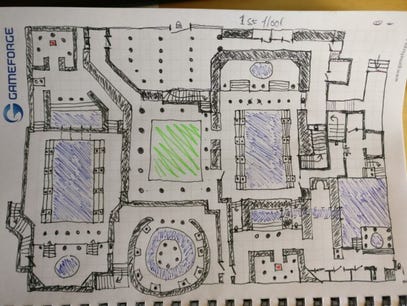
Featured Blog | This community-written post highlights the best of what the game industry has to offer. Read more like it on the Game Developer Blogs or learn how to Submit Your Own Blog Post
It’s neither impossible nor easy to work in the games industry
This post gives a subjective view of what it takes to get a job in the game industry and describes two common attitudes that won't help you get one.

There are two very common attitudes that I'm growing increasingly tired of encountering. The first is the notion that it's completely impossible to get a job in the game industry, or even an internship, because game companies have impossible standards. The companies are to blame, they say, because I deserve a job in the games industry. I have a bachelor, I've gone to game jams and read blogs on Gamasutra, so I am practically destined for a job at DICE or Blizzard, but because these companies are stupid they can’t see that I deserve to work there.
The second, perhaps more common attitude, amongst people who've had little or no contact with actual development is the "Anyone can make an app these days, and make a million bucks! Just look at Angry Birds! I've read about Minecraft, Why don't you make Minecraft and get rich too?"-kind. Wow, that is a long kind of kind. You should work on sentence structure Daniel, and stop whining about other people’s attitudes!
Well, I'm not going to stop, because attitudes are important. The first of these two can be demoralizing to people just starting out, and I've seen it rear its ugly heads on student forums and in Facebook groups where former students lecture the current ones on their chances at a career in games. The second one is not only infuriating, but it belittles the struggle that developers go through to create quality entertainment, and worse, it gives people the wrong idea about what goes into making a game.

So, Daniel, you seem to think everyone else is wrong, what is the truth then? How *do* you get a job in the game industry?
The truth? Well since we live in a post-factual society I will not even try to give you the truth. Instead, I will give you my subjective, probably misinformed, view of what it takes and then let you form your own opinion on the matter.
First: Work really, really hard. Every day. Think of yourself as an athlete or a contestant on a talent show, and be inspired by how much passion they have and how much effort they put into practicing. I teach game & narrative design at a local college and I make sure that my students understand that they need to do more than show up for class and get a degree after a few years in order to land a job once they graduate.
Same goes for those of us fortunate enough to have some sort of job within games: We need to constantly improve. I can't teach my students the same lessons next year because times change, and games do too.
Secondly, make sure to have a healthy mix of theory and practice. Many of us, me included, can get a bit too enamored with theory and the different methods and frameworks of making a game. I watch talks from GDC almost every day, and although I think that is a good habit you will NOT (and it feels stupid, but I feel I must repeat this) get hired based on what you've watched on YouTube. You might get fired for it though, but that's a whole different topic. Theory is great, and you can learn a lot from other developer’s mistakes, processes, and methods, but in the end, you need to get your hands dirty. You need to spit in your palms, grab a shovel and dig into real development. Can't find a team? Go at it alone.
Don't have the time? Prioritize! Don't have the equipment? Borrow a computer, or go to the library, or just write/draw stuff with pen and paper.
As a designer making board games is great practice, and although it might not be the piece in your portfolio that lands you that job at a big studio it certainly does not hurt.

We actually prototype all our level layouts on paper first for our current project.
I have an acquaintance who's a writer/programmer and who is probably the most productive writer I've known. He could write 200-page stories in a month and then get right back to it as soon as one manuscript was finished. To this day, I'm still impressed by his work ethic, and I think he would have done great and become a success as a writer if he just changed one thing: He did not read. Ever. He claimed that he wanted to find his own style, that he did not want to copy the work of any other writer. A noble goal, you might say, and I agree. The problem with this tactic though, and the irony, was that his stories were extremely cliché, and full of stereotypes that he simply did not recognize. He thought of them as original, because to him, they were. He is the reason why I still think every designer, writer, programmer or artists still need to actively take part in what is happening in their creative field, not just put their head in the sand and focus on their own work. Again, try to find a balance between practical development work and theoretical frameworks.
Finally, go to all the parties. This advice isn't really mine, I stole it from someone who I look up to in my local development community and who gave me this advice when I started out, but it makes a lot of sense. Just like nobody will hire you for your YouTube habits, no one can hire you if they don't know who you are.
Besides, getting to know other developers who are as passionate and hard working as you are is one of the most rewarding and inspiring things you can do. Almost everyone I've had the pleasure of hanging out with who works in the game industry has been funny, inspiring, smart and humble individuals. These people also like to help each other out once in a while, so having them around when you send out your résumé can make the difference between a "meh, I don't know" and a "Well, if you say she's ambitious and a nice person I guess we can bring her in for an interview".

In conclusion, I'd like to say this: Getting a job is neither impossible nor easy. It's hard, and it might be harder than you want it to be, more work than you are prepared to put in, and that’s OK. The game industry isn't for everyone. In the end, persistence is probably the most important quality you can have as an up-and-coming developer, or as an up-and-coming anything really. I have friends who've applied for over 100 different jobs without even getting a reply, friends who've worked for free for months hoping to get a permanent position.
Those two now have full-time positions at a great studio, and get a bigger paycheck than I do. Other friends have been unemployed for just as long, but seem to be spending more time complaining about how hard it is on social media than actually developing their skillset or sending out applications, and sadly I don’t they will land a job anytime soon. Don't be that person. Please.
I’m certain that you can get a job in the industry. All you have to do is practice a lot, work hard, mix theory and practice, and go out for drinks with your peers once in a while. Maybe I'll buy you a round of we meet on one of those nights, and you can tell me why I’m wrong about all the things I’ve written in this article.
Also: If you are a student and you want feedback on your portfolio don’t hesitate to ask. I might not get back to you right away, but I try to respond to all applications when there is time.
Thanks for reading, comments are always welcome!
/Daniel
Read more about:
Featured BlogsAbout the Author(s)
You May Also Like







.jpeg?width=700&auto=webp&quality=80&disable=upscale)








